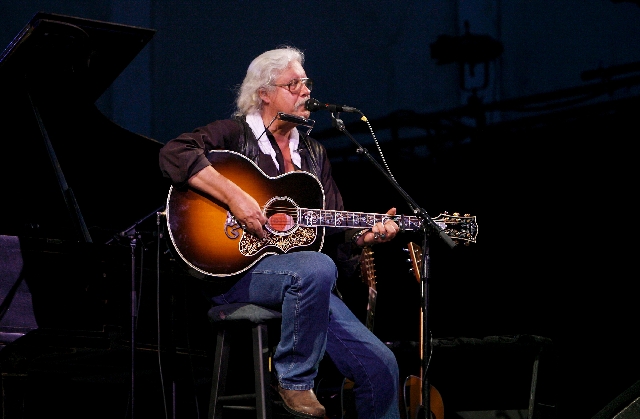Son Arlo pays tribute to his legendary folk musician father, Woody Guthrie

Plenty of people go into the family business. So why should Arlo Guthrie be any different?
Except, of course, for the fact that the family business in question happens to be music — and the family member who started it happens to be legendary troubadour Woody Guthrie.
Both Guthrie generations are represented at The Smith Center tonight as Arlo, now 65, brings “Here Comes the Kid” to Reynolds Hall.
The show first hit the road last July to coincide with centennial celebrations marking Woody Guthrie’s birth on July 14, 1912, in Okemah , Okla. (Which Guthrie once described as “one of the singingest, square dancingest, drinkingest, yellingest, preachingest, walkingest, talkingest, laughingest, cryingest, shootingest, fist fightingest, bleedingest, gamblingest, gun, club and razor carryingest of our ranch towns and farm towns, because it blossomed out into one of our first oil boom towns.”)
Initially, the tour featured Arlo’s entire family.
“There were 14 kids and grandkids on stage,” he says in an email. “But because some of the grandkids had to return to school in September, I continued the centennial tour on my own.”
And, ever since, Arlo’s been on his own; he’s scheduled to tour in “Here Comes the Kid” through May.
“It’s just me, solo,” Guthrie emails. (That is, unless you count the four different guitars and the piano onstage with him.)
“In the beginning, we tried different things until the show became what it is now,” he says. And in the process, “it’s distilled itself into what I think is a really good show.”
The centerpiece of the show: a variety of Woody Guthrie songs that, in his son’s view, “represent his best work throughout his short career.” (Woody Guthrie died at 55, in 1967, from complications from the rare neurological disease Huntington’s Chorea.)
In addition to such singalong classics as “This Land Is Your Land,” the show also features a variety of topical titles, including 1948’s “Deportee” (alternate title: “Plane Wreck at Los Gatos”), about Mexican farmworkers killed in a plane crash, and a “1913 Massacre” of Michigan copper miners and their families.
To Arlo, “it’s fun to play them alone — one guy, one guitar — because that’s the way they were originally done by him.”
Additionally, “I’ve kept a few of his idiosyncrasies in the songs so that people who may never have heard him do them would get some idea of how he played them.”
Because Woody Guthrie “never played the songs the same way twice,” Arlo “ended up choosing the versions I remember.”
Although Arlo has “taken the better part of a year off from being me doing my stuff,” tonight’s show includes a few of his own Guthrie classics.
Among them: 1969’s “Coming Into Los Angeles” and his hit 1972 version of fellow folkie Steve Goodman’s “City of New Orleans.” (All together now: “Good morning, America, how are you? Say, don’t you know me, I’m your native son?”)
But, at more than 18 minutes, Arlo’s 1967 breakthrough — the talking-blues spoof “Alice’s Restaurant Massacree ,” which rambles from Thanksgiving to the Vietnam War — usually doesn’t make the cut.
“Here Comes the Kid” also features songs popularized by some of Woody Guthrie’s musician pals, including Ramblin’ Jack Elliott (“Old Shep”) and Leadbelly (“Alabama Bound”).
Growing up with such folk icons, it’s hardly a surprise that Arlo wound up following in his father’s footsteps.
He received his first guitar from his dad on his sixth birthday and made his public debut at 13, just as the 1960s folk boom was taking off, making household names of such performers as Bob Dylan, Joan Baez — and Arlo Guthrie.
Yet “folk music to me is a little different than how most people think about it,” he says. “For me, it’s not a genre, but rather it’s the songs people sing and play when they get together at weddings, funerals, parties or whatever is going on that could use some music.”
By that definition, “it’s performed by nameless musicians who live in every town. It’s the kids who bring an instrument to someone’s house and play all night.”
To Guthrie, “the music they play is real folk music. Every other definition is academic BS and doesn’t mean anything to me.”
And “in that sense, it’s not any different than what my dad was doing.”
Or, by extension, what the kid’s still doing, carrying on the family tradition as he goes on down the road, from California to the New York skyway to the city of New Orleans — and beyond.
Contact reporter Carol Cling at ccling@
reviewjournal.com or 702-383-0272.